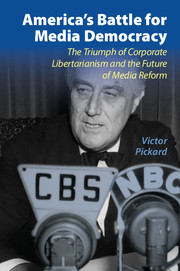 America's Battle for Media Democracy
America's Battle for Media Democracy Book contents
- Frontmatter
- Contents
- Acknowledgments
- Introduction
- 1 The Revolt against Radio
- 2 A Progressive Turn at the FCC
- 3 The Battle of the Blue Book
- 4 The Origins of the Fairness Doctrine
- 5 The 1940s Newspaper Crisis and the Birth of the Hutchins Commission
- 6 Should the Giants Be Slain or Persuaded to Be Good?
- 7 The Postwar Settlement for American Media
- Conclusion
- Bibliography of Primary Sources
- Index
- References
4 - The Origins of the Fairness Doctrine
Published online by Cambridge University Press: 05 October 2014
- Frontmatter
- Contents
- Acknowledgments
- Introduction
- 1 The Revolt against Radio
- 2 A Progressive Turn at the FCC
- 3 The Battle of the Blue Book
- 4 The Origins of the Fairness Doctrine
- 5 The 1940s Newspaper Crisis and the Birth of the Hutchins Commission
- 6 Should the Giants Be Slain or Persuaded to Be Good?
- 7 The Postwar Settlement for American Media
- Conclusion
- Bibliography of Primary Sources
- Index
- References
Summary
Barely a year had passed since the Blue Book controversy when similar conflicts over public interest regulation reemerged. This round of contentious debates centered on whether to repeal the Mayflower Doctrine, which prohibited broadcasters’ political editorializing. Broadcasters’ growing political power emboldened them to challenge the Larry Fly era FCC decision, which would spark the last major radio reform battle in the 1940s. Fearing a further commercialized, conservative-biased, and corporate-dominated medium should broadcasters gain the right to editorialize, many progressives saw at stake, as one news article put it, “the future of radio as an instrument of service to the people.” Reformers marshaled considerable support from the still-intact coalitions from the Blue Book debates to rally for the Mayflower Decision’s preservation. Similar to those debates, broadcasters attacked the reformers’ position with First Amendment arguments that aimed to delegitimate the FCC’s regulatory authority over programming.
This episode involved a number of ironies. Most notably, the controversial rule that later became known as the Fairness Doctrine – which to this day is often invoked by progressives as the high-water mark for enlightened media policy – actually came about as a kind of consolation prize for postwar liberals who were advocating stricter regulation. The following chapter recovers this forgotten history. In doing so, it lays bare a number of early tensions and contradictions that closed out a decade of contentious policy debates around normative understandings of media’s democratic role. This history throws into sharp relief several significant parallels and connections to twenty-first-century media challenges, particularly around the question of whether government has any affirmative regulatory authority over media.
- Type
- Chapter
- Information
- America's Battle for Media DemocracyThe Triumph of Corporate Libertarianism and the Future of Media Reform, pp. 98 - 123Publisher: Cambridge University PressPrint publication year: 2014


